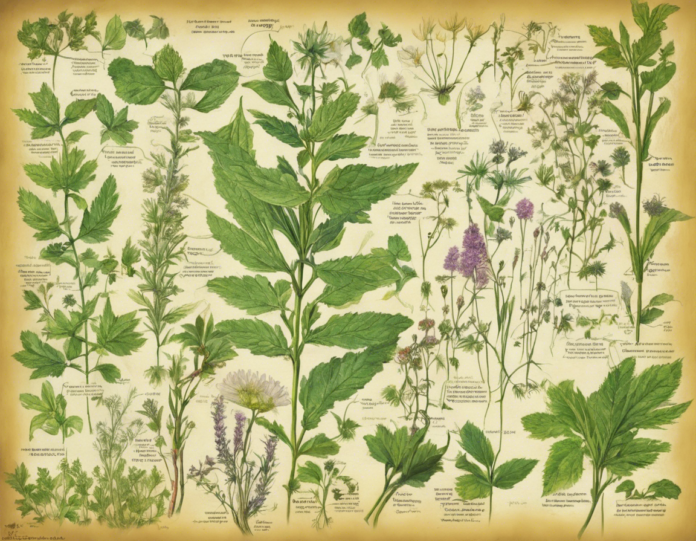Are you seeking alternative ways to enhance your well-being and overall health? In a world where conventional medicine often takes center stage, exploring herbal pathways can offer a natural approach to wellness that dates back centuries. Herbal remedies have been used in various cultures around the world for their healing properties and therapeutic benefits. In this comprehensive guide, we will delve into the world of herbal medicine, exploring its history, benefits, different modalities, and how you can incorporate it into your daily routine.
History of Herbal Medicine
The use of herbal medicine dates back thousands of years, with evidence of its practice found in ancient civilizations such as Egypt, China, India, and Greece. These early societies relied on herbs and plants for medicinal purposes, using them to treat various ailments and promote healing. Herbal medicine has been passed down through generations, with traditional healers and practitioners preserving the knowledge of herbal remedies and their therapeutic effects.
Benefits of Herbal Medicine
Herbal medicine offers a holistic approach to healing, addressing not just the symptoms of an ailment but also the underlying causes. Some of the key benefits of herbal medicine include:
- Natural Healing: Herbal remedies are derived from plants, making them a natural and gentle alternative to synthetic pharmaceuticals.
- Fewer Side Effects: Herbal medicines are often gentler on the body and have fewer side effects compared to prescription drugs.
- Supporting the Body: Many herbs work by supporting the body’s own healing mechanisms, helping to strengthen the immune system and promote overall wellness.
- Personalized Treatment: Herbal medicine can be tailored to individual needs, taking into account a person’s unique constitution and health concerns.
Modalities of Herbal Medicine
There are several ways to incorporate herbal medicine into your daily routine, each offering unique benefits and applications:
1. Herbal Teas and Infusions
One of the most common forms of herbal medicine is through teas and infusions. Herbal teas are made by steeping dried herbs in hot water, extracting their medicinal properties. From calming chamomile to invigorating ginger, there are countless herbs that can be enjoyed in tea form for their various health benefits.
2. Tinctures and Extracts
Tinctures and extracts are concentrated forms of herbal medicine, usually made by soaking herbs in alcohol or glycerin to extract their active compounds. These liquid preparations are often potent and fast-acting, making them a popular choice for addressing specific health issues.
3. Herbal Supplements
Herbal supplements come in various forms, including capsules, tablets, and powders. They are convenient for those looking to incorporate herbs into their daily routine in a more concentrated and easily dosed form.
Incorporating Herbal Medicine into Your Life
If you are interested in exploring herbal medicine, here are some tips on how to incorporate it into your daily life:
- Start Slow: Begin by incorporating one or two herbal remedies into your routine and observe how your body responds.
- Consult a Professional: It’s always a good idea to consult with a qualified herbalist or healthcare provider before starting any new herbal regimen, especially if you are on medication or have existing health conditions.
- Do Your Research: Take the time to research different herbs and their benefits to find the ones that align with your health goals.
- Quality Matters: Choose high-quality herbs from reputable sources to ensure their potency and effectiveness.
- Listen to Your Body: Pay attention to how your body responds to herbal remedies and make adjustments as needed.
Frequently Asked Questions (FAQs) About Herbal Medicine
Q: Is herbal medicine safe to use?
A: When used responsibly and under the guidance of a healthcare professional, herbal medicine is generally safe. However, it’s important to be aware of potential interactions with medications and allergies.
Q: Can herbal medicine cure serious health conditions?
A: While herbal medicine can support overall health and wellness, it is not a replacement for conventional medical treatment for serious health conditions. It can be used as a complementary therapy in conjunction with traditional medicine.
Q: How long does it take to see results from herbal medicine?
A: The time it takes to see results from herbal medicine can vary depending on the individual, the herb being used, and the health issue being addressed. Some people may experience immediate benefits, while for others, it may take longer.
Q: Are there any side effects of using herbal medicine?
A: While herbal medicine is generally considered safe, some individuals may experience side effects such as allergic reactions or interactions with medications. It’s important to monitor how your body responds to herbal remedies and consult a healthcare professional if you have any concerns.
Q: Can anyone use herbal medicine?
A: Most people can safely use herbal medicine, but certain groups such as pregnant women, children, and individuals with specific health conditions should exercise caution and consult a healthcare provider before using herbal remedies.
In conclusion, exploring herbal pathways can offer a natural and holistic approach to enhancing your well-being. By incorporating herbal medicine into your daily routine, you can tap into the healing properties of plants and herbs that have been valued for centuries. Remember to start slowly, do your research, and consult a professional to ensure a safe and effective herbal regimen tailored to your individual needs.









